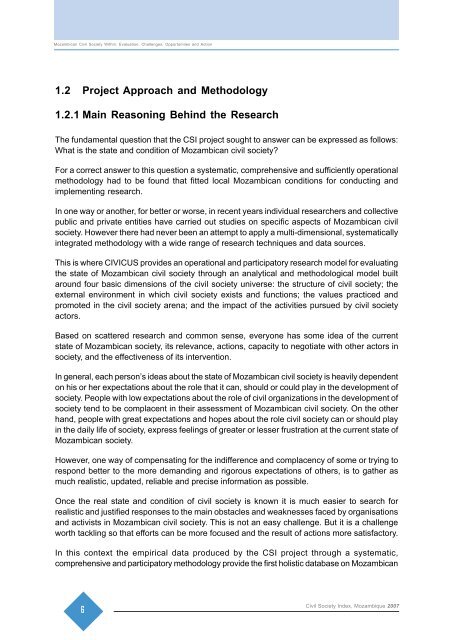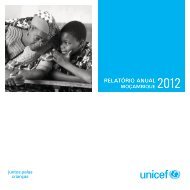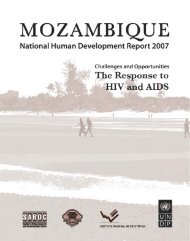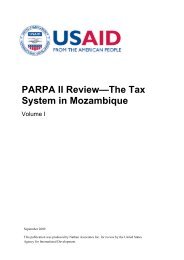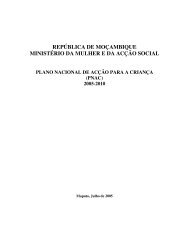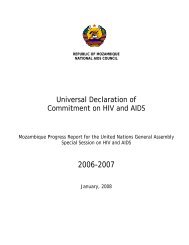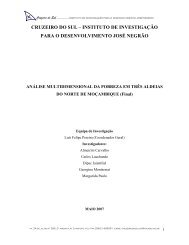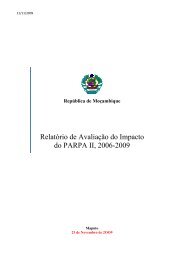Mozambican Civil Society Within: - UNICEF Mozambique - Home page
Mozambican Civil Society Within: - UNICEF Mozambique - Home page
Mozambican Civil Society Within: - UNICEF Mozambique - Home page
You also want an ePaper? Increase the reach of your titles
YUMPU automatically turns print PDFs into web optimized ePapers that Google loves.
<strong>Mozambican</strong> <strong>Civil</strong> <strong>Society</strong> <strong>Within</strong>: Evaluation, Challenges, Opportunities and Action<br />
1.2 Project Approach and Methodology<br />
1.2.1 Main Reasoning Behind the Research<br />
The fundamental question that the CSI project sought to answer can be expressed as follows:<br />
What is the state and condition of <strong>Mozambican</strong> civil society?<br />
For a correct answer to this question a systematic, comprehensive and sufficiently operational<br />
methodology had to be found that fitted local <strong>Mozambican</strong> conditions for conducting and<br />
implementing research.<br />
In one way or another, for better or worse, in recent years individual researchers and collective<br />
public and private entities have carried out studies on specific aspects of <strong>Mozambican</strong> civil<br />
society. However there had never been an attempt to apply a multi-dimensional, systematically<br />
integrated methodology with a wide range of research techniques and data sources.<br />
This is where CIVICUS provides an operational and participatory research model for evaluating<br />
the state of <strong>Mozambican</strong> civil society through an analytical and methodological model built<br />
around four basic dimensions of the civil society universe: the structure of civil society; the<br />
external environment in which civil society exists and functions; the values practiced and<br />
promoted in the civil society arena; and the impact of the activities pursued by civil society<br />
actors.<br />
Based on scattered research and common sense, everyone has some idea of the current<br />
state of <strong>Mozambican</strong> society, its relevance, actions, capacity to negotiate with other actors in<br />
society, and the effectiveness of its intervention.<br />
In general, each person’s ideas about the state of <strong>Mozambican</strong> civil society is heavily dependent<br />
on his or her expectations about the role that it can, should or could play in the development of<br />
society. People with low expectations about the role of civil organizations in the development of<br />
society tend to be complacent in their assessment of <strong>Mozambican</strong> civil society. On the other<br />
hand, people with great expectations and hopes about the role civil society can or should play<br />
in the daily life of society, express feelings of greater or lesser frustration at the current state of<br />
<strong>Mozambican</strong> society.<br />
However, one way of compensating for the indifference and complacency of some or trying to<br />
respond better to the more demanding and rigorous expectations of others, is to gather as<br />
much realistic, updated, reliable and precise information as possible.<br />
Once the real state and condition of civil society is known it is much easier to search for<br />
realistic and justified responses to the main obstacles and weaknesses faced by organisations<br />
and activists in <strong>Mozambican</strong> civil society. This is not an easy challenge. But it is a challenge<br />
worth tackling so that efforts can be more focused and the result of actions more satisfactory.<br />
In this context the empirical data produced by the CSI project through a systematic,<br />
comprehensive and participatory methodology provide the first holistic database on <strong>Mozambican</strong><br />
6<br />
<strong>Civil</strong> <strong>Society</strong> Index, <strong>Mozambique</strong> 2007


